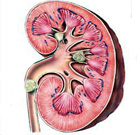
People consuming diet rich in salt are more likely to develop kidney stones and osteoporosis, a bone disease that increases the risk of fracture, finds a study.
Lead researcher Todd Alexander of the University of Alberta and his team have identified an important link between sodium and calcium.
They seem to be controlled by the same molecule in the body. When sodium intake in the body reaches to a high level, the body gets rid of sodium through the urine, taking calcium with it depletes calcium stores in the body.
According to the American Journal of Physiology - Renal Physiology reports, high concentration of calcium in the urine lead to the development of kidney stones, on the other hand insufficient levels of calcium may results in thin bones and osteoporosis,
"When the body tries to get rid of sodium via the urine, our findings suggest the body also gets rid of calcium at the same time," Alexander, researcher in the faculty of medicine & dentistry at the University of Alberta has been quoted as saying.
"This is significant because we are eating more and more sodium in our diets, which means our bodies are getting rid of more and more calcium. Our findings reinforce why it is important to have a low sodium diet and why it is important to have lower sodium levels in processed foods."
"We asked a simple question with our research - could sodium and calcium absorption be linked? And we discovered they are," Alexander said.
"We found a molecule that seems to have two jobs - regulating the levels of both calcium and sodium in the body. Our findings provide very real biological evidence that this relationship between sodium and calcium is real and linked," he said further.
--With inputs from IANS
|
|


Comments: